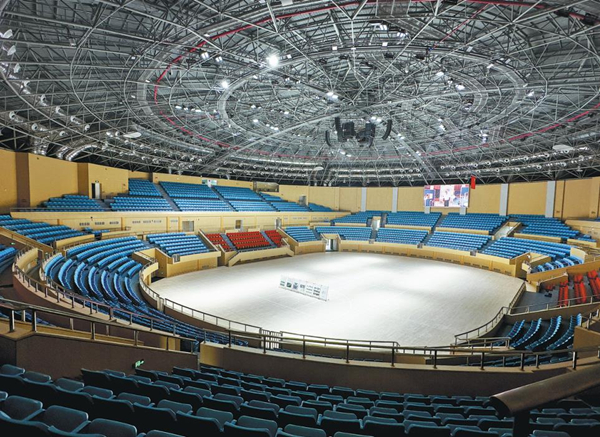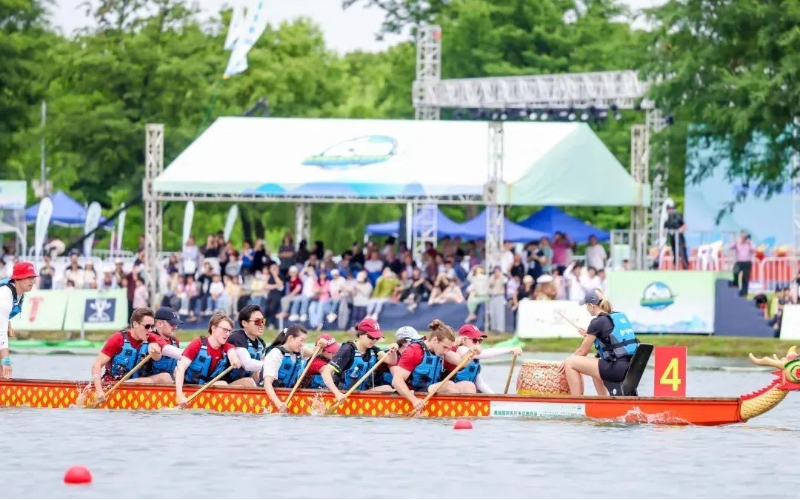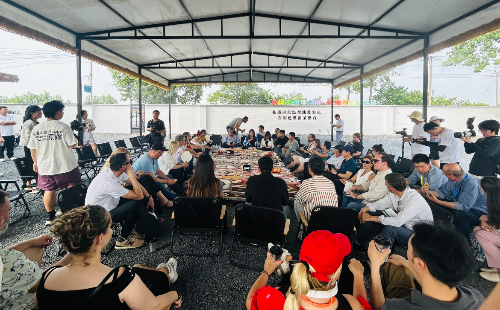Building a sustainable legacy
State-of-the-art venues all stand on a foundation of minimum waste, maximum functionality

Hangzhou Dianzi University Gymnasium will host the fencing events for the Asian Games and Asian Para Games.
Hangzhou, along with the five co-host cities of Ningbo, Wenzhou, Huzhou, Shaoxing and Jinhua in Zhejiang province, has promised an environmentally friendly Asian Games. From the construction, and in some cases restoration, of the venues, to their operation and utilization both during and after the games, sustainability has been integrated into every detail of the preparations, according to the Hangzhou Asian Games Organizing Committee.
Out of the 56 competition venues for the games, only 12 are newly built. The remaining 44, along with 31 training venues, are all renovated from, or temporarily built on, existing sites.
"We have combined Asian Games infrastructure with urban development and construction planning of the host cities," said Qiu Peihuang, director of venue construction on the Hangzhou Asian Games Organizing Committee. "We stick to the principle that the construction of the competition venues is not only for the Asian Games, but also an upgrade to the overall facilities in each city that will serve the communities in the long run."
To ensure sustainability of the venues, the concept of minimum waste has been applied to each one.
Before the renovation of each of the existing venues, the facilities and equipment were comprehensively evaluated for continued use, either for the games or in other places, he said.
Hangzhou Dianzi University Gymnasium, for example, will host the fencing events for the Asian Games and Asian Para Games.
The gymnasium has more than 5,000 seats which have been used since it opened 17 years ago, but they remain in good condition. The organizing committee decided to dismantle and clean the seats and put them back to use in the gym.
The LED screens in the gymnasium, which have been in service for six years, were also relocated to the university's swimming and fitness center for continued use, according to Wang Shuhai, director of waste disposal of the venue operation team of Hangzhou Dianzi University Gymnasium.
In terms of the configuration of facilities and equipment for the competition venues, the organizing committee also applies the principle of minimum waste.
The China Textile City Sports Centre Gymnasium in Shaoxing, originally a basketball stadium, will host the volleyball competitions at the Asian Games. To enable the conversion, a special rubber floor was rented, which is directly laid on the original floor of the basketball court.
"Upon the completion of the games, we can simply return the rubber floor and convert the gym back into a basketball arena," said Dong Gudan, the gym's publicity officer.
Most of the facilities for the temporary venues are set for reuse, as it is the case in the configuration of the Asian Games' squash courts, which are located in a converted exhibition hall of the Hangzhou International Expo Center.
According to Zhou Congcong, director of facilities operation and maintenance of the squash venue, the eight squash courts installed for the games will continue to be used after the games.
"One will be donated to the Asian Games Museum and the other seven will be relocated to communities, schools and other educational institutions, continuing to play a role in promoting squash," Zhou said.
Sustainability is also highlighted in the daily operation of the competition venues.
At the Hangzhou Olympic Sports Centre Aquatic Sports Arena — the competition and training venue for swimming, diving, artistic swimming events — light pipes have been installed to introduce outdoor light during the day and solar-powered light at night.
The venue has a water-storage capacity of more than 10,000 tons. Its continuous water-circulation system will automatically detect and disinfect used water. This will save up to 90,000 tons a year, which is equivalent to the annual consumption of 4,000 people.
To save water, a 24-hour uninterrupted water circulation and disinfection system has been installed to ensure that the water in the pools stays clean and clear without the need to change it regularly.
Sustainability is also manifested in the way the competition venues will continue to operate and benefit the host cities after the games, Qiu said.
"We have taken into consideration, and gone to great lengths, to ensure the best use of the competition venues after the games," Qiu said. "The best scenario is that these venues will be able to make money on their own to sustain their daily operation."
The Hangzhou Esports Centre, a newly built venue, is expected to serve as a good example of this. While the center will continue to serve as a key venue for esports, it is also designed to host ball games, concerts, theatrical performances and trade shows to achieve a full range of social benefits.





 play
play